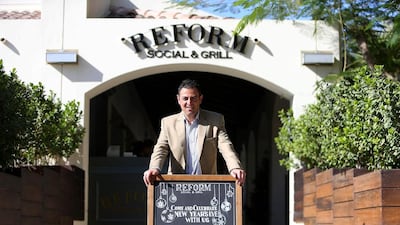Hoteliers and restaurateurs predicted a summer boost as the government of Dubai relaxed Covid-19 rules.
The decision on Monday to cut social distancing from three metres to two metres allows restaurants to fit more tables and diners in.
Hotels can now accept weddings with as many as 100 guests, up from 10 members of one family before. Officials said the one-month trial would remain under review.
Capacity across the industry was cut in January.
"Every single metre matters. That one metre change represents an increase in business of 20 per cent," Naim Maadad, founder of Gates Hospitality, told The National.
“For us, that’s the difference between going from break-even to making a margin of profit.”
Gates Hospitality owns Folly and Reform Social & Grill in Dubai, among other venues.
Nightclubs, and bars that do not serve food, will remain closed.
The move is an extension of a decision taken in January, when daily numbers soared to almost 4,000. On Monday, the number of new cases was about 1,200.
“While it’s unfortunate for many bar owners, this is the right decision,” Mr Maadad said.
“In restaurants there is greater control over social distancing than in pubs and nightclubs, so let’s give it some time.”
High temperatures have begun to drive customers inside, shrinking serving space considerably.
“I’m extremely excited by this positive step. We’re jumping up and down about it,” Mr Maadad said.
Piero Giglio, the managing partner and director of the hospitality group Mine & Yours, said the increase in tables and party-size will boost customer spend.
"It will make a difference to the overall experience. The ambience is affected when you are sitting in a restaurant with only a few tables," said Mr Giglio who formerly ran Il Borro Tuscan Bistro and Alici Seafood Restaurant in Dubai.
"The venue doesn't have the same energy levels, and customers spend more when it's buzzy.
"So it's not just about footfall, it's about the increasing the average customer's cheque."
Tim Cordon, senior vice president for Radisson in the Middle East and Africa, said the easing of the restrictions marked “light at the end of the tunnel” for the industry.
He said the “second-fastest vaccination campaign in the world” gave the country cause for optimism.
“Across the globe the past weeks have been filled with various discussions, from vaccine passports, to safe reopening and the upcoming summer tourism,” he said.
“From an industry perspective, hotels and hospitality venues across the country have been eagerly anticipating the easing of restrictions and increased capacities.”
He said the UAE has set new benchmarks for the world in the fight against Covid-19.
Mr Maadad also highlighted how quickly hospitality staff in Dubai responded to the difficulties caused by the pandemic.
“Ninety-five per cent of the industry has been vaccinated, and the other 5 per cent are either waiting for their visa to come through, or have recently had Covid-19, and need to wait for their vaccine,” he said.
“Our underlying message is that confidence is strong in the market, and the restrictions are finally easing off.”
Mr Giglio who is opening two new Italian restaurants in Dubai this year, including Chic Nonna in the Dubai International Financial Centre and L'Amo in the new Marina harbour, agreed with Mr Maadad's outlook.
"Now that the worst, hopefully, is gone - I think everything will be positive," he said.
"Dubai was always the best place in the world to be during the pandemic because the authorities handled it so well. Now we can plan for the future."
























